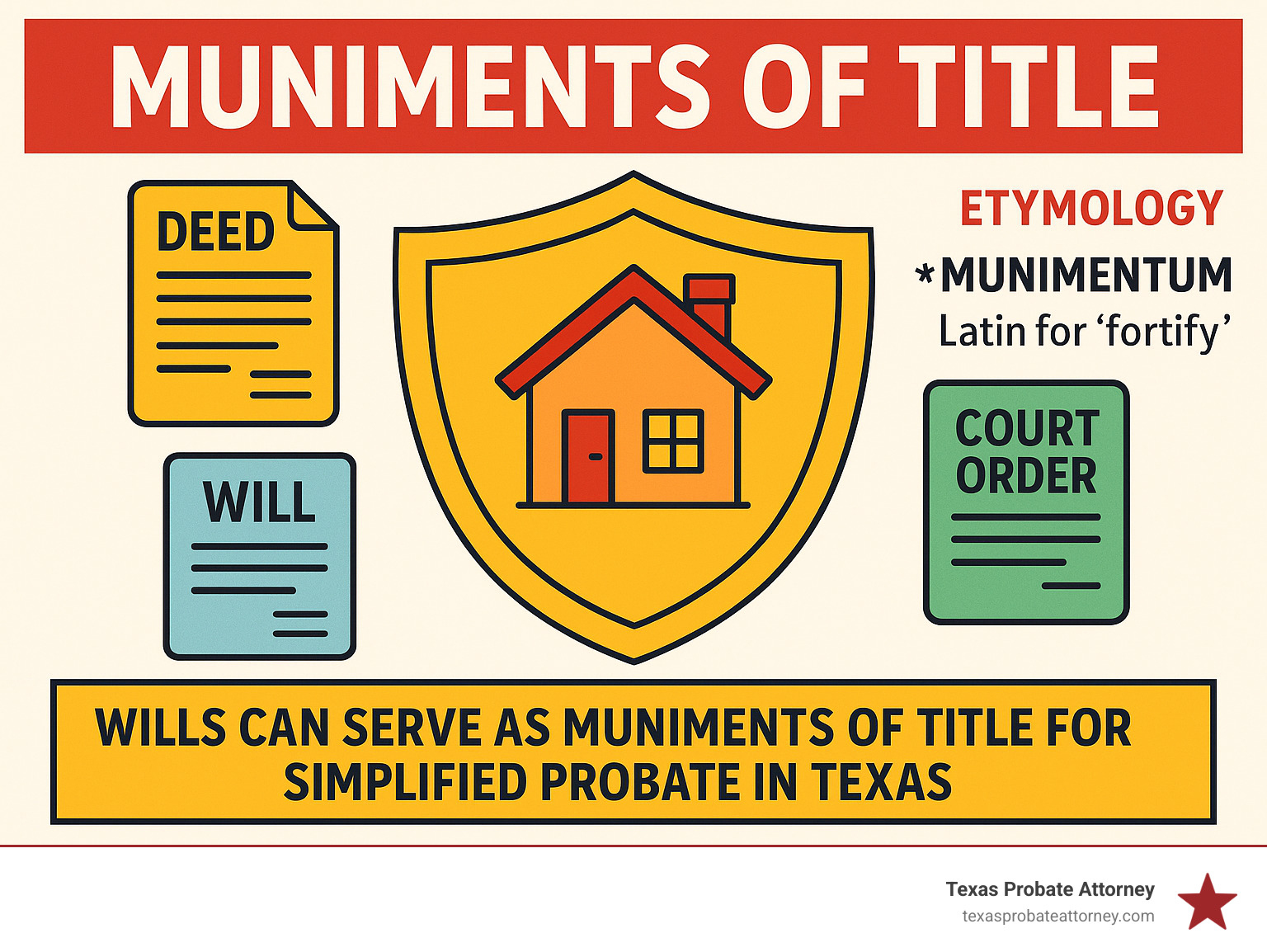Beyond the Deed: Understanding Muniments of Title
What Makes Muniments of Title Essential for Houston, Fort Worth, and Austin Property Owners
For property owners in Houston, Fort Worth, and Austin, muniments of title are the written documents that prove you own property—think of them as your legal armor protecting your ownership rights. These critical papers include deeds, wills, court judgments from Harris, Tarrant, or Travis County courts, and other official records that establish who owns what.
Quick Definition:
- What they are: Legal documents proving ownership of property in Houston, Fort Worth, and Austin.
- Why they matter: They defend your title to real estate and personal property from legal challenges in Texas.
- Common examples: Deeds, wills, court orders, and stock certificates relevant to your local assets.
- Texas advantage: Wills can serve as muniments of title for simplified probate in Harris, Tarrant, and Travis County courts.
The word “muniment” comes from the Latin munimentum, meaning “fortification” or “defense.” Just like a fortress protects a castle, these documents protect your property rights from legal challenges in Houston, Fort Worth, or Austin.
When someone you love passes away in Houston, Fort Worth, or Austin, understanding muniments of title becomes crucial. These documents determine how property transfers to heirs – and in Texas, they can make probate much simpler and less expensive than you might expect.
Texas law offers a unique advantage: under certain conditions, a will itself can serve as a muniment of title, creating a streamlined probate process that avoids the complexity and cost of traditional estate administration.
Muniments of title terms you need:
What Are Muniments of Title in Houston, Fort Worth, and Austin? A Foundational Guide
For residents of Houston, Fort Worth, and Austin, the documents in your safe deposit box are more than just paperwork; they’re your legal fortress. Muniments of title are the written proof that you own property, and understanding them can save you thousands of dollars and countless headaches.
The word “muniment” comes from Latin munimentum, meaning “fortification” or “defense.” These documents defend your ownership rights. Historically, wealthy landowners built special “muniment rooms” to protect these papers. The principle remains the same today in Houston, Fort Worth, and Austin: these documents are your shield against property disputes.
Muniments of title are simply the evidence that proves you own something, telling the complete story of your property’s ownership history in Harris, Tarrant, or Travis County. The evidence that enables one to defend title to an estate, as Merriam-Webster puts it.
For estates in Houston, Fort Worth, and Austin, a properly executed will can itself serve as a muniment of title. This creates a streamlined probate process that’s faster and more affordable than traditional estate administration.
When you’re dealing with property in Harris, Tarrant, or Travis County, these documents don’t necessarily need to be recorded with the county clerk to be valid. But recording them is smart – it gives public notice of your ownership and protects you from someone claiming they didn’t know about your rights.
Common Documents That Serve as Muniments of Title
Think of muniments of title as the key documents in your property’s life story. Each one plays a specific role in proving ownership.
- When transferring property in Houston, Fort Worth, or Austin, Deeds are the primary legal instruments. Warranty deeds offer the strongest protection, while Quitclaim deeds are often used for family transfers but offer less protection. Special warranty deeds offer limited guarantees. Historic original land grants from the Republic or State of Texas also serve this purpose for local properties.
- Your Last Will and Testament becomes a powerful muniment of title once probated. In Texas, a will can be probated as a muniment of title, simplifying property transfers for your loved ones in Houston, Fort Worth, or Austin.
- Court judgments from Harris, Tarrant, or Travis County courts are rock-solid proof of ownership. These include divorce decrees awarding property, probate orders transferring assets, and orders quieting title that resolve ownership disputes.
- Other examples for residents of Houston, Fort Worth, and Austin include stock certificates (proving company ownership), land contracts, death certificates (for property in joint tenancy with right of survivorship), marriage settlements, and prenuptial agreements that define property rights.
The Critical Role in Establishing a Clear Chain of Title
Without muniments of title, establishing ownership of property in Houston, Fort Worth, or Austin would be nearly impossible. These documents create the “chain of title” – the complete ownership history of your property.
When you’re buying property in Houston, Fort Worth, or Austin, you need certainty that the seller actually owns it. Any missing link in this chain can create a “cloud on title,” a legal uncertainty that makes your property difficult to sell or mortgage in the competitive real estate markets of Houston, Fort Worth, or Austin.
Muniments of title are the individual links in this chain. Each deed, will, and court order adds a piece to the puzzle. The county clerks in Harris, Tarrant, and Travis counties maintain these records, creating a public history of property transfers.
Recording these documents gives public notice of ownership changes, protecting future buyers from hidden claims. Banks and title companies in Houston, Fort Worth, and Austin won’t lend money or issue insurance without a clear chain of title backed by solid documentation. Without properly maintained muniments of title, proving ownership becomes a nightmare for your heirs.
The Texas Advantage: Using a Will as a Muniment of Title in Probate
For families in Houston, Fort Worth, and Austin with a valid will, Texas offers a unique probate option: probating it as a muniment of title. This process is faster, simpler, and much less expensive than traditional probate.
This approach avoids appointing an executor, ongoing court supervision, and extensive administrative tasks. The court simply validates the will, which then serves as proof of who inherits what. This is particularly helpful when the main asset is a home in Houston, Austin, or Fort Worth, and the estate has no significant unpaid bills. The order from a Harris, Tarrant, or Travis County court admitting the will as a muniment of title becomes the legal authority to transfer property directly to the beneficiaries named in the will.
The beauty of this process for families in Houston, Fort Worth, and Austin lies in what it avoids. You won’t need to file detailed inventories or deal with creditor claims. Texas Estates Code §257 makes this streamlined approach possible, reflecting a practical approach to helping families settle estates efficiently.
Requirements for Probating a Will as a Muniment of Title in Texas
To use this simplified probate in Harris, Tarrant, or Travis County, you must meet specific requirements before a judge will approve your application.
- The will must be legally valid. The probate court in Houston, Fort Worth, or Austin must confirm the document meets all Texas requirements, such as being signed correctly and properly witnessed.
- No unpaid estate debts (except secured liens on real estate). You must swear under oath to the court that the deceased left no unpaid credit card bills, medical expenses, or personal loans. Mortgages on real property are the primary exception.
- The estate must not need formal administration. This process is for estates in Harris, Tarrant, or Travis County where there are no unsecured debts and the will clearly distributes assets, making a full probate administration unnecessary.
The application process involves filing paperwork with the appropriate probate court in Houston, Fort Worth, or Austin, along with the original will and sworn statements. Typically, after one court hearing, the judge issues an order that serves as your legal authority to transfer assets according to the will.
Muniments of Title vs. Traditional Probate: A Texas Comparison
For families in Houston, Fort Worth, and Austin, understanding the difference between these two approaches can save months of time and thousands of dollars.
| Feature | Muniment of Title Probate | Full Administration (Traditional Probate) |
|---|---|---|
| Executor Appointment | No executor is formally appointed by the court in Houston, Fort Worth, or Austin. | An executor (or administrator if no will) is formally appointed. |
| Letters Testamentary | Not issued. The court order from a Harris, Tarrant, or Travis County court admitting the will as a muniment of title serves as the authority. | Issued by the court, granting the executor legal authority to act on behalf of the estate. |
| Handling of Debts | Requires a sworn statement to the court that there are no unsecured debts of the estate (except for liens on real property). | The executor is responsible for identifying, notifying, and paying all valid debts of the estate. |
| Typical Cost | Generally much less expensive due to fewer court appearances in Houston, Fort Worth, or Austin and less attorney time. | More expensive due to increased court filings, legal fees, and administrative tasks. |
| Average Timeline | Shorter. Can often be completed in a few weeks to a couple of months, depending on court dockets in counties like Harris, Tarrant, or Travis. | Longer. Can take several months to over a year, especially for complex estates or those with many creditors. |
The muniment of title approach treats the will as sufficient proof of ownership transfer, avoiding ongoing court supervision from judges in Harris, Tarrant, or Travis County. Traditional probate involves the court appointing someone to manage the entire estate settlement process under its supervision. For families in Houston, Fort Worth, and Austin with straightforward estates, the muniment of title process is a welcome alternative.
Practical Steps and Potential Problems in a Muniment of Title Proceeding
Once a muniment of title probate is determined to be the right choice for an estate in Houston, Fort Worth, or Austin, the process is straightforward but demands careful attention to detail.
The journey begins with filing the application in the appropriate probate court—Harris County for Houston, Tarrant County for Fort Worth, or Travis County for Austin. This application includes the original will and sworn statements confirming no unpaid debts exist (other than liens on real property).
Next is the court hearing process before a judge in Houston, Fort Worth, or Austin, which is typically a single, brief hearing. The judge reviews the submitted documents, and you may need to answer questions under oath to confirm all legal requirements are met.
When the judge in Harris, Tarrant, or Travis County signs the order admitting the will to probate as a muniment of title, that order becomes the legal authority to transfer assets.
- Transferring real estate requires filing certified copies of this order with the county clerk where the property is located. For example, if property was owned in both Houston and Austin, we would file in both Harris and Travis counties.
- Accessing bank accounts and other assets at financial institutions in Houston, Fort Worth, or Austin involves presenting the same certified copies. The order directs them on who should receive the assets.
While streamlined, the process can have challenges, particularly with financial institutions unfamiliar with this Texas procedure.
Safeguarding Your Documents: A Property Owner’s Responsibility
For property owners in Houston, Fort Worth, and Austin, your muniments of title are irreplaceable. Losing them can create a legal nightmare, and recreating them is a costly process.
- Secure storage is your first line of defense. A fireproof and waterproof safe or a bank safe deposit box at a local Houston, Fort Worth, or Austin branch is essential.
- Digital backups provide another layer of protection for your important property documents. Scan your documents and store them on encrypted cloud services or an external drive kept off-site.
- Organization systems are vital for your Texas property records. Use clearly labeled folders for deeds, wills, and court orders so your family can find them easily during a stressful time.
- Trusted individuals, like your spouse or a Houston, Fort Worth, or Austin attorney, should know where to find these documents and how to access them.
Taking these steps simplifies life for your heirs in Houston, Fort Worth, and Austin, preventing delays and reducing stress and legal fees.
Overcoming Challenges with Banks and Financial Institutions
Frustration can arise when banks in Houston, Fort Worth, or Austin, unfamiliar with this specific Texas law, demand “Letters Testamentary,” which are not issued in a muniment of title probate. Letters Testamentary are only for full probate administrations where an executor is appointed. In a muniment proceeding, the court’s order is the sole legal authority for asset transfers.
Many bank employees in Houston, Fort Worth, and Austin are trained only for traditional probate and may not understand this efficient Texas alternative. We often see grieving clients in Houston, Fort Worth, and Austin turned away by banks demanding non-existent documents. It’s maddening but solvable.
When these institutions push back, we provide them with the certified muniment of title order and citations to the Texas Estates Code. If necessary, we escalate the issue to their legal departments. Reminding institutions in Houston, Fort Worth, or Austin of the legal consequences of refusing a valid court order usually ensures cooperation.
Don’t be discouraged by a bank’s initial confusion in Houston, Fort Worth, or Austin. Your muniment of title order is legally binding, and our experience is invaluable in navigating these obstacles to ensure assets are transferred smoothly.
Frequently Asked Questions about Muniments of Title in Houston, Fort Worth, and Austin
Families in Houston, Fort Worth, and Austin often have questions about the muniment of title process. Here are answers to the most common concerns.
How long does a muniment of title probate take in Houston, Fort Worth, or Austin?
The muniment of title process is much faster than traditional probate, typically taking just a few weeks to a couple of months. The exact timeline depends on factors like the court schedules in Harris, Tarrant, and Travis counties and how well-prepared the application is.
Its simplicity is a key advantage for estates in our service areas. There is usually only one court hearing and no ongoing supervision, a refreshing change from the complexity of full probate.
Can I use a muniment of title if the deceased owned property outside of Texas?
A Texas muniment of title order applies only to property within Texas. It does not automatically transfer property located in other states, as each state has its own property transfer laws.
The good news is the muniment of title simplifies handling the Texas assets efficiently. For the out-of-state property, a separate process called “ancillary probate” is usually required in that state. The Texas order can often simplify ancillary probate elsewhere by establishing the will’s validity.
What happens if a debt is found after a will is probated as a muniment of title in a Harris, Tarrant, or Travis County court?
This is a major concern, as the process in a Houston, Fort Worth, or Austin court hinges on a sworn statement that no unsecured debts exist. If an unknown debt surfaces later, it can create real complications, as a creditor with a valid claim still has rights.
Beneficiaries may become personally responsible for paying the debt, up to the value of the property they received. In some cases, a creditor could push to reopen the estate for a full administration in the original court.
This is why thorough investigation before filing is critical. We help our clients in Houston, Fort Worth, and Austin review financial records and credit reports to identify all potential debts. This diligence protects you from future complications and ensures the muniment of title process proceeds smoothly.
Navigating Your Path Through Texas Probate
Understanding muniments of title is key to efficient estate planning and probate for residents of Houston, Fort Worth, and Austin. These documents are your foundational evidence of ownership that can save your family time, money, and stress.
For families in Houston, Fort Worth, or Austin, Texas’s unique muniment of title process is an invaluable probate tool. By allowing a will to serve as proof of ownership, it bypasses much of the complexity and expense of traditional estate administration.
However, this streamlined process isn’t automatic. Following legal requirements precisely is crucial. The probate courts in Houston, Fort Worth, and Austin require a valid will and a sworn statement confirming no unsecured debts exist (other than liens on real property).
Navigating the probate courts in Harris, Tarrant, or Travis County for a muniment of title requires careful attention to detail. One missed step can derail the process in Harris, Tarrant, or Travis County, forcing a family into the more expensive traditional probate they hoped to avoid.
This is where experienced legal guidance makes all the difference. When banks in Houston, Fort Worth, or Austin don’t understand a muniment of title order or when questions about property transfers arise, you need attorneys who know Texas probate law inside and out.
The attorneys at Texas Probate Attorneys can guide you through the process with personalized attention. With over 40 years of combined experience in Texas probate, we understand the nuances of a muniment of title proceeding. We know how to handle court requirements and resistant financial institutions to ensure the smoothest possible resolution.
Whether you’re dealing with a straightforward estate perfect for muniment of title probate or facing more complex challenges, we’re here to help you find the most efficient path forward.
Learn more about our Texas probate services





